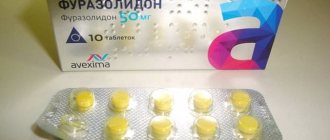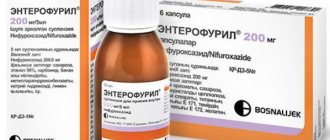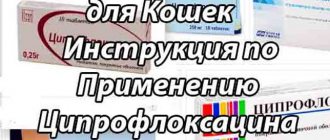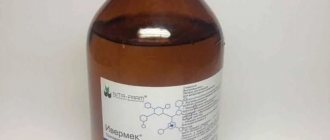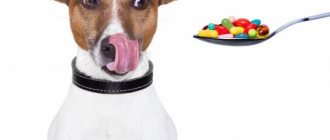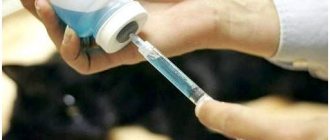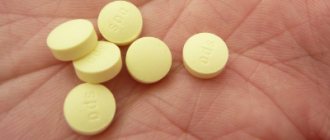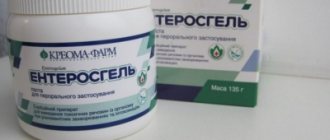Dosage for dogs
Phosphalugel, suspension.
The dose for dogs weighing up to 10 kg is 0.5-1 ml per 1 kg of animal weight, by mouth 2-3 times a day. Before use, the suspension can be diluted with water.
For dogs weighing from 10 to 30 kg - 0.2-0.5 ml per 1 kg of animal weight, by mouth 2-3 times a day.
For dogs weighing from 30 to 50 kg - 0.2-0.4 ml per 1 kg of animal weight, by mouth 2-3 times a day.
For dogs weighing over 50 kg - 10-20 ml, by mouth 2-3 times a day.
How to give liquid medications to a dog?
What diseases is Phosphalugel used in veterinary medicine to treat?
As we have already said, drugs from the category of antacids are used as one of the components of a complex of drugs that work against diseases of the gastrointestinal tract, in any way associated or aggravated due to the increased acidity of the gastric environment and too active acid production. These are the ailments we are primarily talking about.
- So, first of all, it is necessary to mention peptic ulcer of the stomach and duodenum in dogs, in which foci of inflammation form on the mucous inner layer of these organs, which then open and begin to bleed.
- You should also point out gastritis , which may be accompanied by normal secretion of gastric juice, or too active.
- A diaphragmatic hernia may also require treatment with Phosphalugel. With this disease, damage to the diaphragm occurs and the abdominal organs move into the sternum.
- Reflux esophagitis in dogs is an inflammatory process that affects the lower parts of the dog’s esophagus, triggered by the splashing of gastric juice inside them, corroding the mucous membranes of this organ.
- Other diseases associated with disruption of the stomach or intestines, in which the animal’s condition can be aggravated by stomach acid, as well as the ingestion of toxic substances or medications that strongly irritate the gastrointestinal tract into the dog’s body.
Gastritis in dogs
Phosphalugel - composition
1Composition and release form Gel for oral administration (sachets of 16 g) 1 pack. aluminum phosphate 10.4 g sorbitol 70% 4.48 g agar-agar 0.0448 g pectin 0.0872 g calcium sulfate 0.0117 g potassium sorbate 0.0402 g orange flavor 0.08 g purified water up to 16 g per box 20 or 26 pcs.
Gel for oral administration (sachets of 20 g) 1 pack. aluminum phosphate 12.38 g sorbitol 70% 4.2857 g agar-agar 0.08 g pectin 0.1 g calcium sulfate 0.01 g potassium sorbate 0.0530 g orange flavor 0.032 g purified water up to 20 g per box 20 or 26 pcs.
How does the drug "Phosphalugel" work?
The drug "Phosphalugel" is a member of a group of drugs called antacids. This category of medicines works as follows: it is responsible for neutralizing the acid that is produced inside the stomach, originally human, but also canine, for which it is excellent.
Antacids are available on the market in various forms:
- powder;
- tablets;
- suspensions, etc.
Phosphalugel
They are most often used in veterinary medicine to:
- alleviate the condition of an animal suffering from diseases of the gastrointestinal tract, in which excessive acidity of the gastric environment causes the release of secretions into other organs, causing heartburn and chest pain;
- cure gastrointestinal diseases that arise or progress due to excessive stomach acidity by neutralizing gastric acid.
Phosphalugel is available in the form of a gel for oral administration; the dosage, of course, is prepared for humans, so the drug is released in sachets. Unfortunately, dogs must take this medication according to the instructions developed for them by their attending veterinarian. Let's see what doses we are talking about.
Instructions for use of the drug
Indications for use of Phosphalugel
There are the following indications for the use of phosphalugel in dogs:
- All types of ulcerative pathologies of the gastrointestinal tract.
- Gastritis of any etiology. The drug is especially effective for inflammation caused by increased acidity of gastric juice.
- The medicine has proven itself well in the treatment of reflux esophagitis.
- The drug is often prescribed for dyspepsia (digestive disorders) in puppies and very young animals.
- It is used in the treatment of diarrhea of various etiologies in animals of all ages and breeds.
- Many types of poisoning. Phosphalugel has proven itself especially effective in cases of autointoxication of various etiologies, as well as in case of poisoning with inorganic types of toxins.
Contraindications and negative effects
When considering whether a cat can use Phosphalugel, the answer should be yes, except in some special cases.:
- Individual intolerance to components.
- Pathologies of the kidneys or liver.
- Some heart diseases.
Phosphalugel should be used strictly in accordance with the indicated dosage, then the product will only benefit the cat. The uniqueness of the drug lies in the fact that the active substance is dissolved in a gel-like substance, which makes it easier to administer for veterinary purposes.
A well-known European medicine (Netherlands) for stomach diseases, poisoning and hangovers is Phosphalugel. The drug is a whitish thick liquid with a sweetish taste.
In medical practice, the suspension has proven itself to be an effective remedy, widely used for the treatment of children and adults, and more and more often you can hear your veterinarian prescribe this drug.
Indications for use
It is necessary to give Phosphalugel to a cat in the following cases::
- Gastritis;
- Ulcer (stomach, duodenum);
- Diarrhea;
- Other intestinal and gastric disorders caused by poisoning of the cat’s body with medications or other allergens.
Since it is difficult to accurately diagnose these problems on your own, before starting the course you should consult a specialist and strictly adhere to his recommendations.
At home, Phosphalugel is most often used as a measure to help with diarrhea or vomiting in cats. The product also helps reduce acidity in the stomach, reduce irritation, binds toxins and allergens in the animal’s digestive system and allows them to be removed from the body. The drug has proven its effectiveness in solving the problems of food poisoning in pets.
Symptoms
Symptoms of gastritis may appear all at once, or there may be only some of them. Painful sensations in the stomach area almost always occur.
- The dog refuses food completely, or stops eating, leaving most of the portion.
- Refuses to play and walk.
- He behaves passively, goes to a secluded place and lies there, not wanting to change his position.
- Abnormal stool. Constipation occurs if the acidity of gastric juice is increased, diarrhea - if it is decreased. Dark-colored stool indicates that there is bleeding in the stomach.
- Nausea, vomiting. You can see mucus and blood streaks in the vomit.
- Tongue with a white coating.
- The abdominal area is painful. The dog may whine from this. It happens that painful sensations appear if you press lightly on the stomach.
- In acute illness the temperature rises, in chronic illness there is no fever.
Reviews
Review from the owner of a Yorkshire terrier about the drug Phosphalugel: “My Yorkies ate potato peelings, I didn’t notice. They began to vomit and feel sick, but were active as usual. I started giving phosphalugel three times a day with water and another day after the vomiting stopped. Everything worked out, the drug helped us.”
Feedback from a Spitz owner : “I give my dog phosphalugel from time to time if his stomach is grumbling, and it also helps with diarrhea.”
Review from a veterinarian : “We recommend that patients keep Phosphalugel in the refrigerator to help dogs at home. It works well for vomiting, in the complex treatment of gastritis and for allergies to food.”
Most often, veterinarians speak well of Phosphalugel and often prescribe it for vomiting, poisoning, and gastritis in dogs. The drug does not cause side effects.
Precautions when taking the drug
There is no need to take this drug without prescribing it from a veterinarian and without calculating the correct dose. You should also be especially careful when giving it to dogs that have the following ailments:
- heart muscle failure;
- cirrhosis of the liver;
- any renal pathologies.
This drug is one of the safest similar medications on the market, however, before taking it, you need to consult a veterinarian and, if he deems it necessary, undergo some tests.
In addition, it is prohibited to give this drug to dogs if they are simultaneously undergoing treatment:
- tetracycline antibiotics;
- preparations containing iron;
- glycosides.
It is strictly not recommended to prescribe Phosphalugel to a dog on your own.
In emergency cases, when you have to combine the listed medications, start taking them no earlier than two hours after your dog consumes Phosphalugel.
Please note: this remedy can also be taken by pregnant and lactating bitches, however, only if really significant indications for this are taken into account.
Is Phosphalugel safe for dogs? Find out!
A well-known European medicine (Netherlands) for stomach diseases, poisoning and hangovers is Phosphalugel. The drug is a whitish thick liquid with a sweetish taste.
In medical practice, the suspension has proven itself to be an effective remedy, widely used for the treatment of children and adults, and more and more often you can hear your veterinarian prescribe this drug.
It is not surprising that in veterinary practice Phosphalugel is used to treat dogs and cats. This medicine has virtually no contraindications or side effects, and it acts gently and effectively.
Rumbling in the stomach
Gastritis may be accompanied by belching and rumbling in the stomach.
Rumbling itself is not always a symptom of a serious illness; if apart from it there are no other symptoms and the dog is active and feels well, then you can give the dog Phosphalugel. If the rumbling becomes more frequent, it is better to see a doctor.
Chronic renal failure (CRF)
Poisoning or worms can cause complications not only on the stomach, but also on the dog’s kidneys. They are one of the causes of chronic renal failure (CRF) in dogs, along with cysts, neoplasms and inflammation of the kidneys. Also, for example, golden retrievers are genetically predisposed to chronic renal failure.
This disease can be detected at an early stage by urinalysis and ultrasound. Often, in case of chronic renal failure, Phosphalugel is prescribed to remove toxins that the animal’s diseased kidneys cannot cope with. The disease may be accompanied by alternating diarrhea and constipation; with such diarrhea, Phosphalugel is given as a symptomatic treatment.
How to give?
Liquid medications like Phosphalugel should be given from a syringe without a needle of the appropriate volume. Secure your pet on your lap or with your legs, you can do this together with someone from your family. The pet's head should be slightly raised, but do not throw it back so that the dog does not choke.
The medicine is poured from a syringe into your mouth, clench your jaw in your hands and slightly lift your jaw from any convenient side. The dog must swallow the drug and not spit it out.
Side effects
There are no cases of adverse effects of Phosphalugel on animals. The only inconvenience may be spitting out the suspension. In this case, the medicine must be re-administered.
The taste of the medicine is a little sweet and alcoholic, the dog may not like it. Phosphalugel should be given with caution if there is an increase in phosphorus in the blood during chronic renal failure.
These indicators are monitored by tests with a doctor; if you suspect a negative effect of Phosphalugel, you can stop the drug.
For puppies
As soon as a puppy appears in the house, you can safely buy Phosphalugel for your home first aid kit. The drug has proven itself well in veterinary practice.
You need to give the medicine in the same way as an adult dog, focusing on the weight of your animal.
Pregnant and lactating
There are no contraindications or prohibitions for treating pregnant and lactating bitches with Phosphalugel. Phosphalugel is given in a standard dosage; it is only important to know the current weight of the dog and calculate the dose.
Phosphalugel is approved for all breeds of dogs. There are no restrictions or special points, the drug is safe and can be used for any breed of dog.
What to replace it with?
Phosphalugel is generally well tolerated by dogs. If necessary, the medicine can be replaced with activated carbon or smecta, enterosgel - as absorbents. If you need a soothing and enveloping effect on the mucous membranes, then Almagel or Maalox are better suited.
Conclusion
Phosphalugel should be in a dog breeder's home medicine cabinet for a number of reasons. The drug is freely available in regular pharmacies; there is no need to look for it in special veterinary pharmacies.
The medicine has proven itself to be an effective aid for dogs of all ages and breeds with digestive disorders, poisoning and allergies. Take care of your pet and protect its health, and if necessary, do not delay a visit to the veterinarian.
Source: https://puppy.plus/zdorovie/lechenie/preparaty/protivyazv/fosfalyugel-sobake.html
Composition and properties of Phosphalugel for cats
This drug is produced in the form of a gel with the scent of orange. It is used for therapy in both humans and animals. The main active component of the drug is aluminum phosphate. In addition, the preparation includes agar-agar, pectin and sorbitol. These substances perform an auxiliary function and enhance the effect of the antacid.
In addition, the auxiliary components present have an enveloping effect, reducing the irritating effect of hydrochloric acid on the inflamed membranes of the stomach and esophagus. The medication also gives a slight anesthetic effect.
The use of Phosphalugel helps eliminate bloating, excessive gas formation, diarrhea and a number of other manifestations of inflammatory diseases of the gastrointestinal tract.
Main characteristics
Phosphalugel is a medication that belongs to the group of antacids. It was initially developed for the treatment of humans, but later its effectiveness in treating animals was also proven. It is often prescribed to reduce the acidity of the stomach contents, which helps restore the normal state of the animal in a number of pathologies of the gastrointestinal tract.
This remedy removes toxins from the body and destroys pathogenic microflora. At the same time, Phosphalugel is not able to change the color of animal feces. This is extremely important because... Based on the color and consistency of feces, a veterinarian can determine the cause of intestinal symptoms in a cat.
Analogues:
There is no exact copy of the product, but you can find drugs on sale that have the same positive effect. Here are some of them:
- Almagel and alphagel.
- Omeprazole.
- Maalox.
- Enterosgel.
- Smecta.
We strongly do not recommend using substitutes to treat cats. But if you decide to take it, you should consult your doctor before using it. Remember that if you self-medicate, you will only harm your cat.
We tried to tell you in detail how phosphalugel is used for animals and talked about its properties. Watch your pet's diet, and then everything will be fine with his health. Good luck to you!
Operating principle
Phosphalugel helps neutralize hydrochloric acid and reduces the activity of gastric juice. In addition, the active components of the drug slow down the protealic activity of pepsin, i.e.
the process of breaking down protein into simple amino acids that can be absorbed in the intestines. It helps eliminate toxins.
At the same time, the components of the drug are not absorbed into the blood and do not have a complex effect on the pet’s body.
Your dog has diarrhea with blood or mucus
What to do if a dog has diarrhea with blood and (or) mucus, or only with blood or mucus, you should immediately take your pet to a veterinary clinic, where they will conduct the necessary examination, provide immediate assistance and advise on further treatment.
For mechanical damage and tumors, surgery may be prescribed. Based on blood test results, the degree of anemia and the cause of inflammation in the animal’s body will be revealed.
Possible reasons
Possible causes of bloody diarrhea in a dog:
- Damage to the intestinal walls from an accidentally swallowed sharp object;
- Pancreatitis;
- Stomach ulcer;
- Dysbacteriosis;
- The presence of parasites in the internal organs (worms);
- Atypical form of rabies (the intestines become inflamed, bleeding ulcers form on the walls);
- Poisoning with toxic poisons or medications;
- Diarrhea with blood, almost not mixed with excrement, may indicate bleeding in the large intestine;
- Intestinal infections (bleeding ulcers occur in the digestive tract);
- Tumors in the intestine;
- Enteritis, in which ulcers and erosions develop, including the well-known “distemper”;
- Hemorrhagic leptospirosis (parasites settle in the kidneys and liver, after which they damage the vessels of these internal organs and intestines).
Treatment
How to treat a dog that has diarrhea with blood and/or mucus? Of course, such a symptom cannot be ignored, even if it disappears after some time.
Scratched intestinal walls, even if the cause goes away on its own, can lead to the development of serious inflammation. Therefore, it is necessary to undergo examination and take wound healing agents.
In case of poisoning of various kinds, it is necessary to rinse the dog’s stomach in a clinical setting, give it water with adsorbents, and in severe cases, inject it with antibiotics.
Dysbacteriosis as a consequence of a lack of indigestible fiber is eliminated by adding it, for example, in the form of bran; bacterial growth in immunodeficiency is treated with courses of probiotics, antiseptics and immunomodulatory agents.
Various parasites, including worms, are treated with antiparasitic drugs (for example, the popular McMiror, albendazole). Severe bacterial, viral and intestinal infections will require treatment with antibiotics and antiviral drugs, which will be prescribed by your doctor.
Dosage and instructions for use
This medication can be used to treat cats only on the recommendation of a doctor and following the instructions on the package. Phosphalugel therapy should continue for 4 days.
If symptoms persist, it can be increased to 7 days. The dose is selected taking into account the weight of the pet. For 1 kg, 0.5 ml of gel is enough.
The product should be given to the cat every 8-12 hours, depending on the severity of the symptomatic manifestations of the disease.
Phosphalugel can be used to treat kittens. They can inject it into the animal's mouth with a syringe without a needle. The dosage is also selected for adult animals based on weight. To enhance the effect of Phosphalugel during treatment, in the presence of severe diarrhea and vomiting, it is recommended to give this drug with a remedy such as Lactofiltrum. This will contribute to the rapid elimination of existing manifestations of the disease.
If the symptoms are caused by damage to the liver or pancreas, a gel is possible, but the pet should not be fed, even if the cat does not refuse food. At the same time, the animal must have access to water. This will have a positive effect on the process of removing accumulated harmful substances.
Diagnosis and treatment
If you suspect gastritis in a dog based on its symptoms, you must contact a veterinary clinic for diagnosis and treatment. The fact is that similar signs may indicate some other diseases.
The veterinary clinic will perform an X-ray, ultrasound, and in some cases a biopsy. Based on the results of these examinations, the type of gastritis is determined and treatment is prescribed.
Complex treatment includes:
- if gastritis is caused by poisoning, then the stomach is washed out; in other cases, on the contrary, antiemetics are prescribed;
- for constipation - a laxative, for diarrhea - a tonic;
- if the body is dehydrated, droppers are prescribed;
- products are needed that restore and protect the gastric mucosa (Almagel, De-nol, Phosphalugel and others);
- painkillers or antispasmodics;
- antibiotics - depending on what type of gastritis is determined after the examination;
- if the dog is very exhausted and has lost weight, vitamins are prescribed.
On the first day of an exacerbation, you should not feed the dog. Usually, when the dog feels unwell, he refuses to eat. To avoid dehydration, you need to drink water.
The veterinary clinic will tell you not only how to treat gastritis, but will also prescribe a diet for the period of exacerbation.
Diet during exacerbation of the disease
In case of exacerbation, you will have to give up dry food. At first - only natural low-fat products. They must be boiled and crushed.
The volume of food per day should be 1/5 less than the usual portion. You need to feed 5 or 6 times a day, in small portions, with an equal interval between feedings.
What to feed when treating gastritis:
- rice or rolled oats. In the first two days they give a decoction of these cereals, in subsequent days they should be ground in a coffee grinder and then boiled. You can boil it and grind it through a sieve.
- low-fat cottage cheese - you can mix it with porridge, or you can give the entire portion at one time;
- From lean meat, twist the minced meat and boil. Serve with porridge.
- boiled grated carrots.
Diet food should not be thick. It can be diluted either with cereal broth or with a small amount of low-fat meat broth.
When the pet’s health begins to improve and symptoms no longer appear, then the food can no longer be chopped. You need to move on to larger pieces of meat gradually.
If before the disease the food consisted of dry food, then when switching to it after recovery, special medicinal food must be given for some time. In the future, you should only buy premium food.
Learn about essential drugs in animals
- Zantac for cats (instructions, doses)
- Zantac for dogs (instructions, doses)
- Kvamatel for dogs
- Kvamatela for cats
- Losek for animals
- Losek for cats (instructions for use)
- Losek for Dogs
- Kvamatel for animals
- Almagel for cats
- Acylok for dogs. How to dose acyloc in ampoules for dogs
- Acylok for veterinary medicine
- Almagel for dogs
- Acylok in cats
- Almagel (aluminum hydroxide) for animals
^Top
Description
The drug Phosphalugel belongs to the group of antacids and can be used to solve a number of problems in humans, dogs, cats and other representatives of the animal world. It is sold both in regular, “human” pharmacies and in veterinary clinics.
Phosphalugel is a gel of uniform concentration, white in color, intended for oral administration. Among its most significant components we name :
- Aluminum phosphate (active substance);
- Agar-agar;
- Sorbitol;
- Pectin.
Due to the presence of flavoring, the gel has a pleasant aroma and taste of orange. It is produced in bags, the packaging is equipped with instructions for use, and brief information is contained on each of the bags.
The beneficial effects of Phosphalugel are very diverse:
- Enveloping;
- Adsorbent;
- Neutralization of hydrochloric acid;
- Mild analgesic effect;
- Decreased pepsin activity.
Due to this, the product allows you to get rid of diarrhea and vomiting, gas formation, and cleanse the intestines of pathogenic microorganisms and harmful substances.
Phosphalugel for dogs in case of poisoning
Phosphalugel for dogs belongs to a group of antacid medications that neutralize acid in the stomach. The drug helps eliminate heartburn and stomach pain, and is produced in the form of a gel for oral administration.
general description
Phosphalugel is a medical product that can be used in veterinary medicine. The gel has a sweet taste, so your pet may mistake it for a treat. To give medicine to a dog, you must follow the instructions and recommendations of the veterinarian.
Composition and action
Phosphalugel contains aluminum phosphate, which neutralizes hydrochloric acid in the stomach. It creates a protective layer on the mucous membrane of this organ of the digestive system, which protects the mucous membrane from the effects of acid, toxic substances, and digestive enzymes.
Having shown its effectiveness in the treatment of many diseases of the gastrointestinal tract in humans, the drug is also actively used in veterinary medicine when digestive problems are associated with increased acidity of gastric juice. By neutralizing acid, Phosphalugel prevents the release of gastric secretions, which cause heartburn, into other organs.
Therapeutic effects of the active component of the drug - aluminum phosphate:
- acid-neutralizing (alkalization of gastric juice);
- adsorbent;
- enveloping.
Thanks to the action of aluminum phosphate, gastric juice is alkalized to a physiological level; a protective layer is formed on the mucous membranes of the esophagus, stomach, and intestines, preventing the absorption of toxins and other substances that poison the body. The use of Phosphalugel helps remove gases, toxins, and pathogenic microorganisms from the digestive tract, and facilitates the passage of stomach contents through the intestines.
The medicine is a safe drug and alleviates the condition of your pet:
- in case of poisoning;
- dysbacteriosis;
- changes in the acidity of gastric secretions;
- chronic pathologies of the gastrointestinal tract.
Purpose
Phosphalugel is used in veterinary medicine to treat chronic and acute pathologies of the digestive tract in dogs associated with increased acidity of gastric juice.
The drug alleviates the condition of a pet suffering from chronic gastrointestinal pathologies, in which gastric secretions are released into other organs, causing pain and heartburn.
It is used as an independent medicine or prescribed as part of complex therapy for pathologies of the digestive system.
Phosphalugel is recommended by veterinarians:
- in case of poisoning, intoxication of the pet’s body, regardless of the reasons that caused them;
- gastroesophageal reflux (reverse movement of stomach contents into the esophagus);
- gastritis;
- increased stomach acidity;
- abdominal pain;
- diarrhea caused by a functional bowel disorder;
- dysbacteriosis;
- diaphragmatic hernia, etc.
Increased stomach acidity in dogs is characteristic of hyperacid gastritis. The causes of the disease may be:
- low-quality food that does not contain the microelements necessary for the body;
- constant consumption of only dry food;
- monotonous food;
- feeding food that is too hot or, conversely, too cold;
- helminth infection;
- the use of certain medications that can irritate the mucous membrane of the stomach and intestines, which leads to inflammatory processes in the digestive organs;
- infectious diseases;
- peptic ulcer;
- the presence of neoplasms – benign or malignant.
Gastritis in dogs is manifested by the following symptoms, which require immediate contact with a veterinarian and additional examinations:
- pain and cramping in the abdomen and in the stomach area (the dog whines and does not allow you to touch its belly);
- bloating;
- indigestion (diarrhea or constipation - with high acidity constipation is more common);
- apathy, depression;
- decreased or complete loss of appetite;
- weight loss;
- deterioration in wool quality;
- nausea, vomiting;
- white coating on the oral mucosa.
With gastritis, a dog may vomit. It usually occurs immediately after eating or, conversely, when the pet is hungry. Taking Phosphalugel will help stop vomiting, but if there is blood in the vomit, you need to immediately contact a veterinary clinic.
With intestinal obstruction or intestinal infection with worms, dogs may vomit bile. Phosphalugel will help neutralize its aggressive state on the pet’s esophagus and make it feel better. In case of poisoning or intoxication, it will help the liver and kidneys quickly remove toxins from the body.
Only a veterinarian can make a diagnosis after examination.
Dosage
It is more convenient to give medicine to a dog using a syringe without a needle - at the root of the tongue. The sweetish taste does not cause disgust in the animal, so drinking the gel to a dog usually occurs without difficulty.
The drug is medical, therefore, when using it in the treatment of pets, you should follow the recommendations received from your veterinarian. The medicine contains aromatic additives (has an orange taste), which may not be to the liking of every pet, so the gel should first be diluted with water to neutralize the odor.
The dosage will depend on the weight of the pet:
Appearance
The rules for taking medication depend on the animal’s diagnosis:
- in case of poisoning, intoxication - at the first manifestations;
- gastroesophageal reflux, diaphragmatic hernia - after evening feeding;
- peptic ulcers - during exacerbation, pain, 2-3 times a day, 1-1.5 hours after feeding;
- gastritis - before feeding.
You should not give your pet Phosphalugel for more than a week or use the medicine for self-medication.
Restrictions
- with heart muscle failure;
- liver cirrhosis;
- renal pathologies.
Phosphalugel should not be used simultaneously with tetracycline antibiotics or iron-containing medications. With caution, veterinarians prescribe the medicine to pregnant and lactating females.
An overdose is undesirable; it can cause a decrease in intestinal motility.
Analogues and prices
You should consult your veterinarian about the possibility of changing the medication. Other antacids used are:
You can buy Phosphalugel at any regular pharmacy; the cost of the drug is 170-200 rubles.
Reviews
Venus, owner of the Yorkshire Terrier
I always try to closely monitor the condition of the animal, but here on a walk my daughter didn’t notice, and the dog ate something, which in the evening made the dog feel sick and vomit.
I called a veterinarian I knew, and he recommended giving me Phosphalugel, one of the medications that was in the home medicine cabinet.
The dog quickly felt better; at the veterinarian’s appointment in the morning, the doctor no longer noticed any abnormalities in his health.
Angelica, owner of the Japanese Chin
I once noticed that the dog’s stomach was grumbling. Dala Phosphalugel: I have gastritis, so I always have medicine in the house. It helped: the grumbling stopped, the dog became happier.
Ivan Nikolaevich, veterinarian
Many “human” medicines also help animals. For example, I often prescribe antacids - Phosphalugel helps dogs with gastritis and some other stomach diseases. It is inexpensive, always available - you can buy it at any pharmacy. And most importantly, it helps and alleviates the animal’s condition well.
source
Is Phosphalugel safe for dogs? Find out!
A well-known European medicine (Netherlands) for stomach diseases, poisoning and hangovers is Phosphalugel. The drug is a whitish thick liquid with a sweetish taste.
In medical practice, the suspension has proven itself to be an effective remedy, widely used for the treatment of children and adults, and more and more often you can hear your veterinarian prescribe this drug.
It is not surprising that in veterinary practice Phosphalugel is used to treat dogs and cats. This medicine has virtually no contraindications or side effects, and it acts gently and effectively.
Is it possible?
Having convinced themselves of the safety and excellent effectiveness, veterinarians often prescribe Phosphalugel to dogs. The drug is approved for use in pets. Let's look at cases in which a veterinarian may prescribe Phosphalugel for your dog.
Reference. Phosphalugel consists of aluminum phosphate and auxiliary substances.
For diarrhea
Diarrhea can occur in tailed friends due to stale food, due to drinking poor-quality water, for example, from a pond or puddle, as well as through contact with sick animals or diseases of the dog’s gastrointestinal tract.
Try to remember whether there were similar cases in the last hours and days before the animal began to have loose stools. Diarrhea may be accompanied by refusal to eat, vomiting, or a rumbling stomach.
Measure your pet's temperature, pay attention to your friend's drinking habits and general condition. In cases of a truly serious illness, treatment will be prescribed by a doctor, which may include Phosphalugel. You can also treat diarrhea yourself if it is caused by poor food or poor nutrition.
Vomit
In addition to diarrhea or constipation, and sometimes along with them, your dog may vomit. The causes are often infection, worms, stress, overheating, allergies, gastrointestinal diseases or feeding problems. The cause of vomiting in a dog can be overeating or a foreign object getting into the throat.
Important! There are pathological types of vomiting that require immediate medical attention: vomiting with blood, vomiting several hours after feeding, repeated vomiting, vomiting on an empty stomach or immediately after eating may indicate gastritis or an ulcer.
Gastritis and bile nausea
Fostfalugel is prescribed for vomiting and gastritis in dogs in approximately the same way as in humans. The dog may also vomit bile. This indicates either intestinal obstruction or helminthic infestation.
Before going to the doctor, you can give your dog Phosphalugel to relieve these symptoms and the pet’s well-being.
Source: https://hpt-kld.ru/fosfalyugel-dlya-sobaki-pri-otravlenii/
